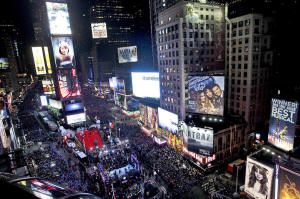Appeals court keeps New York’s gun restrictions in place, including
Times Square and subway ban
[September 20, 2025]
By MICHAEL R. SISAK
NEW YORK (AP) — No guns for Elmo, Spider-Man or anyone else in New
York’s Times Square — and don’t try sneaking them into the subway,
either.
That is the decision Friday from a federal appeals court effectively
upholding a New York state law that bars firearms in “sensitive”
locations, including the tourist mecca known as “the crossroads of the
world," the New York City subway system and commuter trains.
The 2nd U.S. Circuit Court of Appeals affirmed a lower court judge’s
2023 ruling that let the state law remain in effect after several gun
owners filed a lawsuit challenging the constitutionality of some
restrictions. An appeals court ruling last year has allowed other parts
of the law to remain in effect.
The plaintiffs, Jason and Brianna Frey and William Sappe, had sought a
preliminary injunction blocking the enforcement of provisions in the
law, known as the Concealed Carry Improvement Act, that have allowed
authorities to declare Times Square a “Gun Free Zone,” ban open carry
and require a special permit to carry guns in New York City.
U.S. District Judge Nelson Stephen Roman rejected that request, leading
to the appeal decided Friday.
A three-judge 2nd Circuit panel ruled that the challenged restrictions
fall within the country’s "historical tradition of gun regulations and,
thus, does not violate the Second Amendment" right to bear arms. The
plaintiffs, they concluded, are "unlikely to succeed on the merits" of
their arguments.

Times Square gun ban consistent with history, judges say
Banning guns in Times Square, a swath of midtown Manhattan that is often
teeming with sightseers and costumed movie and cartoon characters posing
for pictures, is similarly consistent with history dating back to
medieval England of "prohibiting firearms in quintessentially crowded
places,” the judges wrote in a unanimous opinion. The same holds for the
subway and the Metro-North commuter rail service, which connects the
city with northern suburbs and Connecticut.
“There is perhaps no public place more quintessentially crowded than
Times Square,” the judge said, describing the brightly lit,
billboard-lined area as “our modern-day, electrified, supersized
equivalent of fairs, markets, and town squares of old.”
Despite that, Judges Robert D. Sack, Reena Raggi and Joseph F. Bianco
noted that they were not determining “the ultimate constitutionality of
the challenged provisions.” They returned the case to Roman’s court for
further proceedings.
Sack was appointed to the appeals court by President Bill Clinton, a
Democrat; Raggi was appointed by President George W. Bush, a Republican;
and Bianco was appointed by President Donald Trump, a Republican.

[to top of second column]
|

In this Dec. 31, 2011 file photo, the crowd packs New York's Times
Square during the New Year's Eve celebration as seen from the
Marriott Marquis hotel. (AP Photo/Mary Altaffer, File)

“The Second Circuit decision is disappointing, but not unexpected
considering its palpable disdain for the Second Amendment,” said Amy
Bellantoni, a lawyer for the plaintiffs.
New York Attorney General Letitia James, whose office defended the
law in court, said in a statement: “New Yorkers deserve to feel safe
on public transportation and everywhere in our state, and today’s
decision affirms that right."
“Common-sense gun laws save lives, keep guns out of sensitive
community spaces, and help address the gun violence crisis,” said
James, a Democrat. "New York has some of the strongest common-sense
gun laws in the nation, and my office will continue to defend them
and protect New Yorkers.”
Ruling is the latest one upholding New York law
Friday’s decision is the latest court ruling allowing the Concealed
Carry Improvement Act to remain in place, and it echoed rulings that
have echoed similar restrictions in other places. The New York law
was signed in 2022 as the state’s answer to a U.S. Supreme Court
ruling that some of its previous gun regulations were
unconstitutional.
Gov. Kathy Hochul, a Democrat, and state lawmakers rewrote the
regulations after the high court struck down the state’s
longstanding requirement that people demonstrate an unusual threat
to their safety to qualify for a license to carry handguns outside
the home.
Last year, the 2nd Circuit upheld other parts of the law, including
requirements that concealed carry permit applicants demonstrate good
moral character, disclose the names of household and family members,
submit to an in-person interview, provide character references and
undergo 16 hours of training.
In that ruling, the appeals court also upheld provisions banning the
concealed carry of firearms in certain sensitive places and allowing
private property owners to post signs prohibiting guns on their
property.
Federal appeals courts around the country have ruled similarly in
other states, including Hawaii and Virginia, and on Sept. 10, the
3rd U.S. Circuit Court of Appeals upheld New Jersey’s ban on guns in
sensitive places like schools and public gatherings. Those judges
also cited a historical tradition of gun regulation, writing that
for certain “discrete locations” the presence of guns was
"historically regulated as jeopardizing the peace or posing a
physical danger to others.”
All contents © copyright 2025 Associated Press. All rights reserved |